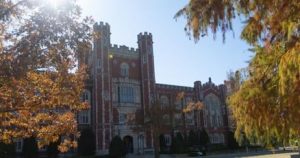The University of Washington’s campus in Seattle transformed into a battleground of ideologies as hundreds of students congregated for a passionate rally amid escalating tensions in the Israel-Gaza conflict. Pro-Palestine and pro-Israel factions clashed in a charged atmosphere, embodying the visceral emotions reverberating from the ongoing crisis in the Middle East.
The rally, marked by fervent chants of ‘Intifada Revolution’ and vocal expressions of solidarity with Palestine, underscored the depth of sentiment and engagement with the deeply entrenched geopolitical struggle.
Amid the charged atmosphere, reports emerged of Jewish students shedding tears and expressing deep anguish over the rally’s perceived one-sidedness, evoking a complex mixture of emotions reflective of the broader conflict’s intricate layers.
The rally, held in the university’s Red Square, epitomized the challenges of facilitating dialogue and peaceful coexistence amidst a polarized global context, prompting a crucial reexamination of the delicate balance between free expression and the promotion of inclusive campus discourse.
The event’s resonance was further amplified by the somber backdrop of recent violence, including the tragic deaths of individuals from both Palestinian and Israeli communities, illustrating the human toll of the prolonged conflict. As the University of Washington navigated the complexities of upholding its commitment to diverse perspectives and the condemnation of violence, the rally served as a microcosm of the broader challenges faced by educational institutions grappling with the ramifications of international strife on their campuses.
In response to the gathering, University President Ana Mari Cauce condemned attacks on civilians and affirmed the institution’s commitment to fostering a safe and respectful environment for all students. Cauce’s message, emphasizing the need for compassion and understanding amidst a climate of heightened tension, highlighted the imperative of fostering open dialogue and mutual respect as essential pillars of the university’s ethos.





